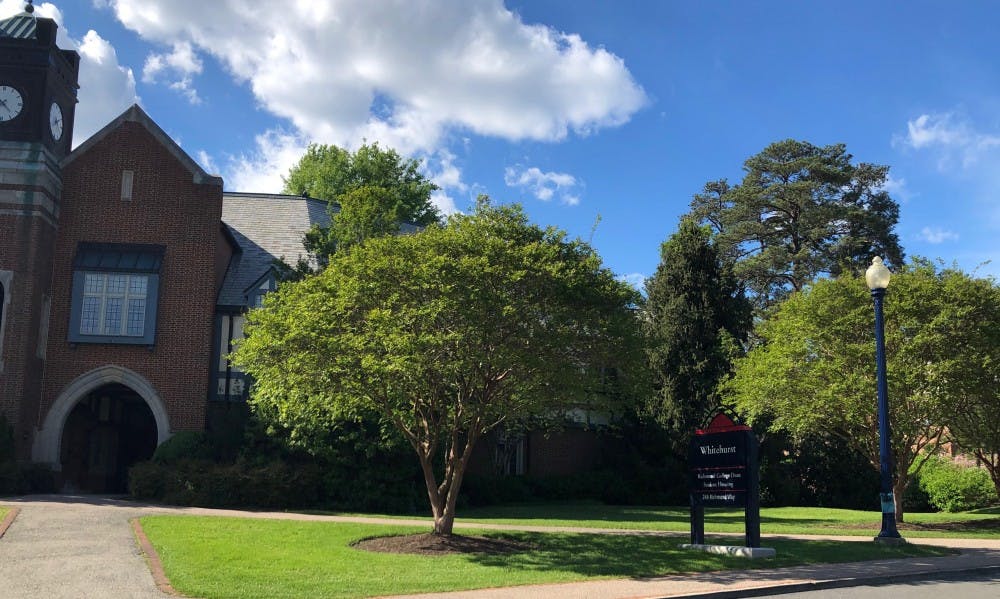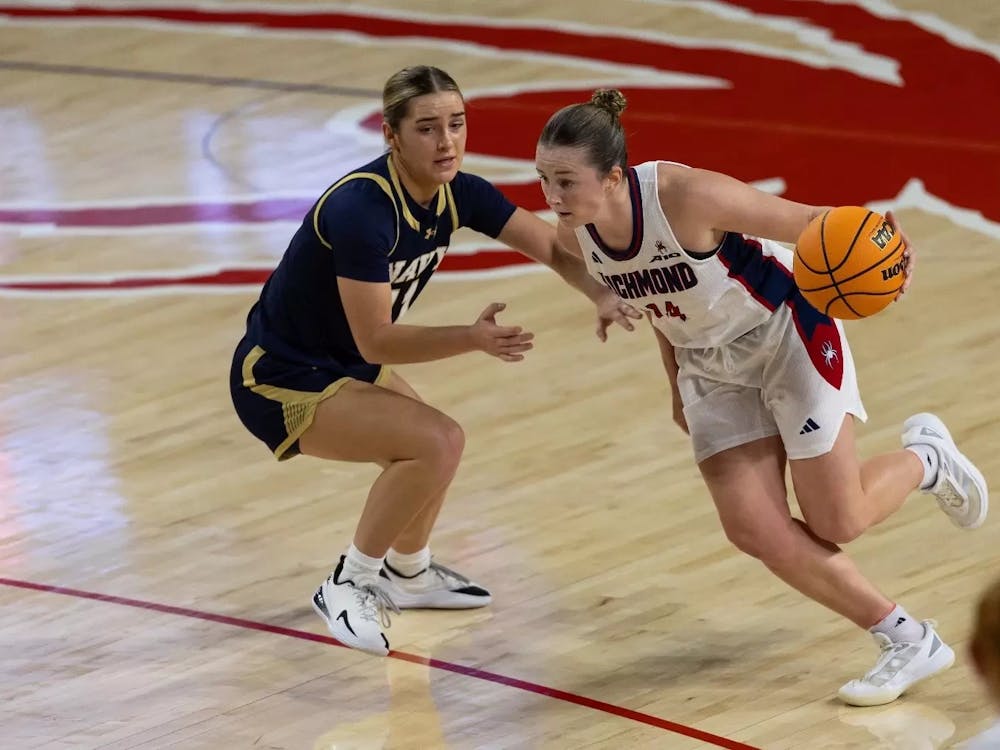Editor's Note: This article was updated to correct information regarding the origins of the concept for the multicultural space. The concept was started under members of a Multicultural Student Solidarity Network executive committee
A student-run executive council and a faculty advisory team were established to oversee the University of Richmond's first multicultural space, which will be located in Whitehurst this fall.
The three-semester pilot space is being established in response to the multicultural student housing proposal submitted by students in the fall 2018 semester. The proposal, titled "Deconstructing the Narrative: Claiming our Campus," is attached in full below.
The proposal addressed the need for a space to provide more social opportunities on campus, particularly for minority students.
Click to view the full proposal for the Multicultural Student House that was submitted in fall 2018.
The space will provide a location for organizations to meet as well as for students to do work and socialize.
The concept of a multicultural space first started two years ago under an executive committee from the Multicultural Student Solidarity Network (MSSN). Members of the executive committee included seniors Michael Johnson, Melisa Quiroga, Destiny Riley, Joshua Kim and Pjay Togunde.
TJ Tann, sophomore and current MSSN co-president, voiced his support for the space.
“I’ve talked to a number of students who feel uncomfortable in class, walking through campus and through the halls,” Tann said. “They go back to their dorms Friday and Saturday night because they feel like they don’t have a place to go.
"So, the purpose I find [it] to serve, is to get those kids who don’t feel as comfortable at other spaces on campus to be able to come together and use that space as a way to refuel — to just be yourself and express your culture freely.”
Enjoy what you're reading?
Signup for our newsletter
The proposal was led by MSSN and received support from other organizations on campus, including the Richmond College Student Government Association (RCSGA), the Westhampton College Government Association (WCGA), the Black Student Alliance (BSA) and the Inclusion Diversity Equity Advocacy committee.
In fall 2018, a group of students, including Tann, self-titled the "OG committee," met with members of the administration to discuss the details of a multicultural space, and a faculty task force was assembled to deal with the logistics.
Mia Reinoso Genoni, Westhampton College dean and head adviser for WCGA; Glyn Hughes, director of the Office of Common Ground and Ellen Sayles, associate dean and director of education abroad, were appointed to the task force.
In response to a question about why UR had not created a space until now, Genoni said the university had wanted to first get a better understanding of what was needed to create an effective space.
"There's been an understanding for the need of [a multicultural space], but not a knowledge of the right way to go about it and a fear that we would build something and get it wrong," Genoni said. "Our job was to try to get it off the ground, because it was time to get something done."
In March, a new advisory team made up of five faculty members was created for the pilot space. The team consists of Anthony Crenshaw, associate director of student organizations and leadership development; Chantelle Bernard, associate director of multicultural affairs and disability services; Lee Dyer, associate director for LGBTQ Campus Life; Zara Sibtain, assistant dean of Westhampton College and Akhila Vishnubhotla, assistant director of living-learning and Roadmap programs.
"We designed the team of people working on it to allow for a dynamic of student and administration working together in a way that allows students freedom to try and preserve student creativity and initiative," Genoni said. "We really tried to make that dialogue part of the process and make it collaborative."
In February, the "OG committee" voted on the eight members of its executive council for fall 2019. Applications for the council were open to all students who would be on campus for the next three semesters, so that members could oversee the entire duration of the pilot.
The council is made up of sophomore Ayush Malik and first-years Anthony Lawrence, Nysa Stiell, Brianna Silva, Nadia Iqbal, Pranay Bhootra, Shira Greer and Tommy Na.
Lawrence, who is also a member of BSA, was voted chair of the executive council.
"It’s going to be the executive council’s responsibility to distribute equitably the space to different student organizations, determining the details of what it’s going to be and creating a plan of achieving the end goal of the multicultural house being built," Tann said.
At the end of the three semesters, depending on the success of the pilot, there will be an evaluation of what to do next regarding a more permanent space or developing the space into a standalone building on campus.
"At every university, you're always worried that you're going to spend all this money building something, and you can listen to everyone carefully and still get it wrong, because people don't always know what they need from a space until they've tried it," Genoni said. "Hopefully we can take a temporary space and use it to start to fill needs and also, through doing that, start to get a better sense of what we do need.
"This has to be a commitment to an answer. This was not 'let's just try and see what happens,' but 'let's try this to make sure that something happens.'"
In the 2019 edition of the Princeton Review, UR was ranked ninth in the country in colleges with "little race/class interaction." Lawrence and fellow BSA member Tyler York, senior, say they think a multicultural space will decrease segregation, not add to it.
"There’s this impression that when you design a space for certain students, for a certain community, with some intention behind it, it inherently excludes other people,” York said. “But we just don’t see it that way, and it hasn’t played out that way on other campuses.
"In a lot of ways, it’s an opportunity for students to not have to code-switch or put up any wall amongst their peers, and when they go back out, they’re more willing to participate in the wider campus community.”
Lawrence wanted to be clear that although the pilot space is designed for multicultural students to have a place where they can feel at ease, it is open to all students, he said.
"The operations of it will be for all, but we want the intent of the building geared towards multicultural students, those whose voices do not seem to be heard on this campus often enough," Lawrence said. "We want administrators to be dedicated to this project to show that they not only acknowledge our presence on campus, but support it as well."
Lawrence is dedicated to seeing the goal of a multicultural building become a reality.
"This space will not only be a safe haven to relax and be our own selves with those we resonate with, but with proof of consistent use, it will show the university that yes, we are here, we stand together and we do need a building or house dedicated to us students," Lawrence said. "The building of this house will certainly not be the solution to all ethnic, race or social-economic issues on campus, but we believe that it would be a serious step in the right direction made by the university.
"There are campuses such as Bucknell, Oberlin, Vanderbilt, that already have structures like this. Why has Richmond waited this long?"
Contact contributor Meredith Moran at meredith.moran@richmond.edu.
Support independent student media
You can make a tax-deductible donation by clicking the button below, which takes you to our secure PayPal account. The page is set up to receive contributions in whatever amount you designate. We look forward to using the money we raise to further our mission of providing honest and accurate information to students, faculty, staff, alumni and others in the general public.
Donate Now



